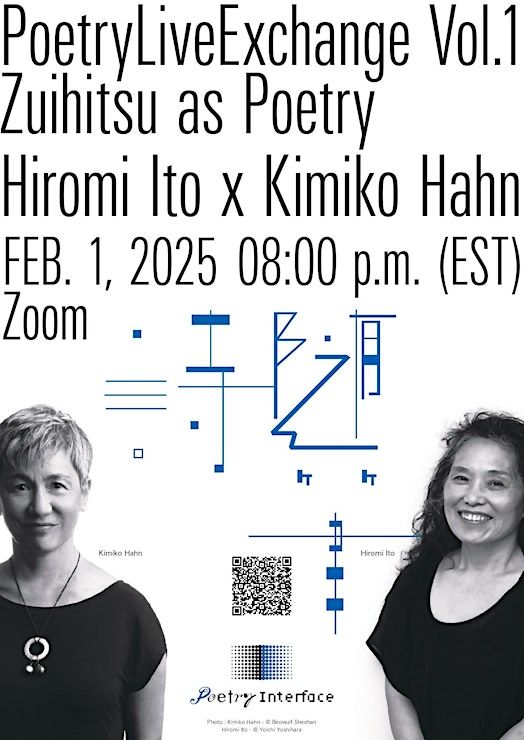In Japanese literature, Zuihitsu has long been a form of expressive, reflective writing. In English-speaking contexts, this traditional genre has been received and explored, and evolved into a new form of poeticexpression. Kimiko Hahn has been leading this exploration including through her own poetry. On the other hand, Hiromi Ito has built a distinctive literary world through a free-flowing style that seamlessly moves between poetry and prose.
In this event, Kimiko Hahn, drawing from her Japanese-American background, and Hiromi Ito, who has long lived in the United States, will share their perspectives on the fusion of poetry and essay, the influence of cultural backgrounds, and the impact of language. As a special highlight, the poets will perform live readings of their works, creating a unique moment where cultures intersect and merge.
Speakers
Hiromi Itō is a Japanese poet, born in Tokyo in 1955. She made her debut in 1978 after winning the Gendaishi Techo Award. Exploring themes of gender and the body, she became a leading figure in the 1980s women’s poetry movement and pioneered the genre of “child-rearing essays.” Her unique approach to capturing the lives of women has resonated with a wide audience. From 2018 to 2021, she served as a professor at Waseda University.
Her accolades include the Takami Jun Prize for Kawara Arekusa (2006), the Hagiwara Sakutarō Prize for Toge-Nuki: Shin Sugamo Jizō Engi (2007), the Murasaki Shikibu Prize for Literature (2008), the Naoki Award (2015), the Taneda Santōka Award (2019), the Chikada Award (2020), and the Kumamoto Literary Award for Michiyukiya (2021).
Itō has also worked on modern translations of Buddhist scriptures, publishing Reading the Heart Sutra and Someday I Will Die, Until Then I Will Live: My Own Buddhist Sutra. Other notable works include Hiromi Itō Poetry Collection (Gendaishi Bunko), Continued: Hiromi Itō Poetry Collection (Gendaishi Bunko), Uma-shi, Shoro no Onna, Forest Correspondence: Traveling with Mori Ogai in Berlin, and Tito, the Wild Puppy.
Her poetry has gained international acclaim, particularly the English translation of Toge-Nuki: Shin Sugamo Jizō Engi, titled The Thorn Puller (2022), which has drawn significant attention in the U.S. Other English translations of her work by Jeffrey Angles include Killing Kanoko: Selected Poems of Hiromi Itō (2009), Wild Grass on the Riverbank (2014), and Killing Kanoko / Wild Grass on the Riverbank (2020).
Kimiko Hahn is author of eleven collections of poetry, including The Ghost Forest: New & Selected Poems (W.W. Norton, 2024) which plays with given forms while creating new ones, and, in doing so, honors past writers. Her last collection, Foreign Bodies, revisits the personal as political while exploring the immigrant body, the endangered animal’s body, objects removed from children’s bodies, and hoarded things. Previous books Toxic Flora and Brain Fever were prompted by fields of science; The Narrow Road to the Interior takes title and forms from Basho’s famous journals. Reflecting her interest in Japanese poetics, her essay on the zuihitsu was published in the American Poetry Review.
In 2023, Kimiko was named a Chancellor for the Academy of American Poets and received The Poetry Foundation’s Ruth Lilly Lifetime Achievement Award. Additional honors include a Guggenheim Fellowship, PEN/Voelcker Award, Shelley Memorial Prize, Theodore Roethke Memorial Poetry Prize, American Book Award, and NEA Fellowships. In her service to the field, she enjoys promoting chapbooks and has created a chapbook archive at the Queens College Library. Hahn is a distinguished professor in the MFA Program in Creative Writing & Literary Translation at Queens College, The City University of New York.

